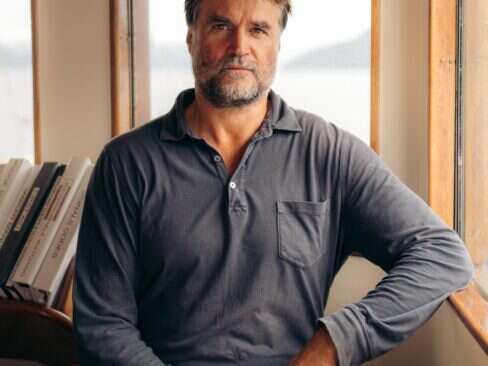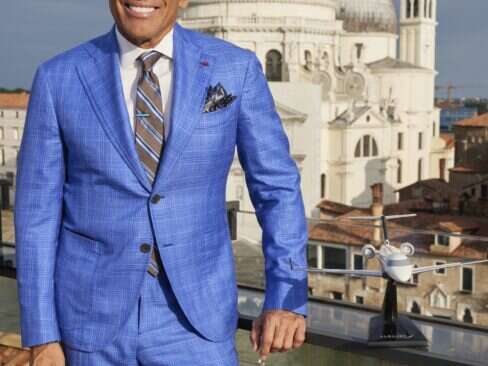
General Manager Upper House Hong Kong
With a powerful parent in Swire & Sons, personal connections to two of Hong Kong’s most legendary hotels, a unique residential feel, an understated and interesting design, innovations in service delivery, unique room amenities and spectacular views Upper House will try to carve a spot among the city’s top properties. Despite the clouds of a global recession hanging over its October debut, Elite Traveler President & Editor-in-Chief Douglas Gollan toured the hotel with Mandarin alum General Manager Dean Winter to find out how Upper House plans to become a respite for elite travelers.
ET: So tell us about the hotel.
Dean Winter: First and foremost its part of a much bigger picture for Pacific Place [a large multi-use shopping, hotel and office complex on Hong Kong island]. Pacific Place is now 20 years old and Upper House is the first phase of the redevelopment. Upper House is designed to complement the other hotels [JW Marriott, Island Shangri-La and Conrad], and being at the top half of this building gives us exceptional views. I think the product, the way Swire built it, speaks for itself, in the materials, in the hardware.
We are located starting on the 38th floor, and the hotel is 11 floors with 117 total rooms. We have four categories of rooms starting with Studio 70, the smallest at 68 square meters, then Studio 80, which are 80 square meters. Bathrooms are extremely spacious, at least 34 square meters. There are 21 Upper Suites at 118 square meters and two Penthouses at 180 square meters each. The bathrooms in each category are spectacular with oversize walk-in showers and deep tubs with spectacular views through floor-to-ceiling windows.
The rooms are designed to feel residential, like a friend’s apartment. There is a mini-bar or what we call a Maxi-Bar, which is really a wine cooler with full bottles of wine fairly priced, about $40 for a bottle, and all beer, soft drinks and snacks are complimentary. Same with the Internet, it is included. If you have a certain wine you like, let us know and we will stock it for you every time you come stay with us. We want you to feel at home. We don’t want to charge the rates of a luxury hotel and then start charging for the Internet or a Coke in your room.
If you look at the desks, you don’t see any folders, brochures or clutter. So you come in the room and it’s your space. You open the desk draw and there is an iPod, and on it is everything you would typically find in one of those scuffed up, dog-ear hotel directories, including the room service menu. You can simply click and email your order. There is even a customer survey so you can tell us if you are happy or upset very easily. Of course, we have printed menus if somebody wants it.
The technology is easy to use. We wanted to make it easy so you can feel right at home and not have to spend a lot of time figuring out how to turn the lights on or off.
We have amazing views of the lush green mountain here on the island as well as our famous harbor, and in the rooms we have tried to bring some of those same subtle tones and colors through.
ET: Tell us a bit about Swire & Sons.
Dean Winter: John Swire has been trading since the mid 1800s and in the mid sixties Swire Properties was founded here in Hong Kong. In the early 1980s they acquired a barracks that they turned into Pacific Place here. We are 100 percent owned and 100 percent managed by Swire and are a fully-owned subsidiary Swire Hotels.
This is the second House Hotel. Opposite House is a 99-room new build hotel that opened in Beijing last year right before the Olympics in a much bigger development owned by Swire.
Opposite House was designed by a Japanese architect—it’s minimalist and contemporary, provocative and interesting. Here [Upper House] the architect and designer is Andre Fu who is Cambridge-trained, and this is his first hotel. He is known more for his restaurants. He has done a wonderful job with a challenging shell. The emphasis is on sustainable and quality materials. At nighttime as you walk around in the public spaces you feel like you have escaped from the city. It is very serene yet the views are simply spectacular.
ET: What type of expansion is coming up?
Dean Winter: We have a third hotel for the group, second in Hong Kong, opening January near Quarry Bay called East. It is a 350-room lifestyle business hotel. Swire Properties has a significant amount of commercial office space in that area, and it is under-supplied by quality hotels. The tenants [in Swire’s office space] are CNN, Bloomberg, Amex, LVMH and the like. We have plans to open a second hotel in Beijing and in Shanghai where we are building another Pacific Place type of development that will have a Swire hotel. In the UK we have four hotels that will be re-branded as Swire Hotels from next year in university cities—Bristol, Exeter, Cheltenham and Brighton. It is a market that is currently niche and we would like to be the top hotel in the market. Outside of that, there are lots of discussion.
ET: Are there any goals in terms of 30 hotels in 10 years, or something like that?
Dean Winter: The short answer is no. Swire Hotels will operate hotels where Swire Properties operates mixed-based developments.
ET: Is Swire Hotels a brand?
Dean Winter: Swire Hotels is more of a B2B brand. The Opposite House, The Upper House, East are all distinctive. There could well be more ‘Easts’ but there will not be a second Upper or Opposite House, but there may be more ‘Houses.’ We use different architects and designers at each, so in our case it is ‘Upper House, recommended by Swire Hotels.’
ET: It sounds a bit like a modern version of Orient-Express Hotels.
Dean Winter: Precisely, absolutely right.
ET: Tell us a bit about your career.
Dean Winter: I was with Mandarin Oriental Hong Kong on and off for 16 years—and from 2001 to 2006 I was part of the renovation team with [former General Manager] Peter French when we closed and then re-opened the hotel. I learned quite a bit there about construction and renovating a hotel that came in handy here. In between my two stints with Mandarin, I was the General Manager for Terrence Conran’s restaurants in London. Prior to that Savoy. My career path was Food & Beverage so I was a bit of a frustrated chef, and being with Terrence got that out of my system.
ET: You’ve worked for several very successful, very different companies. Any thoughts on the contrasting styles and philosophies?
Dean Winter: Swire being the most current, I’ll start there. Swire has a wonderful approach to business. Their family philosophy is basically “to be, but not to seem to be.” In layman’s terms it means go off and be successful but don’t make a big deal about it. It creates a very good atmosphere of getting things done, but not a lot of patting yourself on the back. Jardine is much bigger and when you work for a brand like Mandarin Oriental it comes with great expectations, and I was very proud to wear my fan pin. Conran was very entrepreneurial, and I really learned how to run a business, and in London, work with a multi-national workforce delivering a high level of service, which might be a bit more challenging there than here in Asia.
ET: In a new company, Swire Hotels, were you able to start with a clean slate?
Dean Winter: Being new and being small has its advantages. Having worked at Mandarin Oriental I learned a lot about what business travelers are looking for. Expectations are changing and that allowed us to design things differently here. We don’t have in this hotel a cashier’s desk, a concierge desk. We have a team that helps you. The person who carries your bag in the morning could be the person who helps you pay your bill or makes your arrangements to go see a show. It means we have the opportunity to get a lot closer to the customer and know more about what the customer is looking for. It doesn’t make us better, it makes us different. Five hundred-room hotels need those divisions, but being smaller we were able to do things in a different way.
ET: Have you made any changes to the hotel or opening taking into account the poor economy?
Dean Winter: We have always been very optimistic and we felt October would be the bottom. It was an opportunity for us to prepare for when the market swings back, so we haven’t made any compromises in the fit out, and that’s one advantage of being part of Swire.
ET: Were there any places you looked for savings?
Dean Winter: In labor, we started a five-day work week instead of six because eventually that’s going to happen here, so we were able to save head count by cross-utilization without compromising on service.
ET: What is the customer profile you expect?
Dean Winter: There are a few profiles: discerning business travelers, more senior executives who have latitude to stay where he or she likes to stay, entrepreneurs, then also people who come and stay at the Four Seasons or Mandarin because they are contracted on business, but on leisure want something different. The entertainment industry we think will like us as a hideaway because of our discreet entrance, the fashion business because of our place here in Pacific Place—so Richemont, LVMH and Chanel—and of course the upscale affluent leisure market.
ET: So you have strong ties to The Mandarin, which is a legend here in Hong Kong, but so does the partner in your restaurant.
Dean Winter: We are delighted to have Café Gray and Gray Kunz. The position is as a neighborhood restaurant with a high degree of recognition from the service, and the restaurant will give us some buzz. It’s a nice story for him and us coming back to where he was known at Plume [at The Regent, now InterContinental, another legendary Hong Kong hotel]. Both the locals and some of the expats really remember Gray and Plume very fondly, so yes it is a very nice story.










